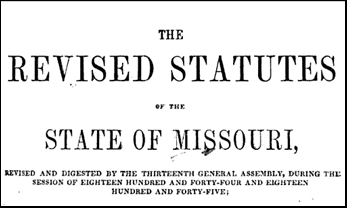Missouri’s manslaughter law
So… did you watch Who Do You Think You Are? last night?
The Legal Genealogist did.
 In a room with most of the 200 genealogists attending the Genealogical Research Institute of Pittsburgh.
In a room with most of the 200 genealogists attending the Genealogical Research Institute of Pittsburgh.
Where else is a place going to break into cheers when a murder is mentioned? (Records. All those wonderful juicy records.)
And where else will people be yelling that if she’d just read the whole pension file, she’d have found out much more…?
And where else will students in the inaugural session of Law School for Genealogists immediately think to themselves, while they were watching the program, that they needed to “examine the statutes to figure out what constituted ‘manslaughter’ in 1843 Missouri”?1
Because, after all, we can’t possibly begin to decide if Martha Casto was justly convicted of manslaughter or not unless we know just what the elements of the crime were.
So… Could you find the definition of manslaughter in Missouri law in 1843?
Here are some hints.
Missouri’s statutes were revised and codified at least twice around the time of Martha Casto’s murder indictment in 1843:
• They were digested by the Eighth General Assembly in 1834-35 and the Revised Statutes produced by that effort were printed at the Argus Office in St. Louis in 1835.2
• They were also revised and digested by the Thirteenth General Assembly in 1844-45 and the Revised Statutes produced by that effort were printed for the State by J.W. Dougherty in St. Louis in 1845.3
So if you find both of those, and you find the definition of first degree manslaughter there, I have two questions for you:
1. What was the definition of first degree manslaughter in 1843, when Martha Casto was convicted of that crime?
2. Do you think she was guilty of first degree manslaughter?
SOURCES
- Cari Taplin, status update, 23 July 2014, Facebook (http://www.facebook.com : accessed 24 July 2014). ↩
- Revised Statutes of the State of Missouri (St. Louis : Missouri General Assembly, 1835). And no, I’m not going to tell you exactly where you can find this online. Do your homework, class. ↩
- The Revised Statutes of the State of Missouri (St. Louis : Missouri General Assembly, 1845). And no, I’m not going to tell you exactly where you can find this online, either. ↩



That was a wonderful episode filled with surprises. I’m not a lawyer (nor do I play one on TV but I have slept at Holiday Inn Express from time to time), but I would go with 1st degree manslaughter assuming there were eyewitnesses who testified that Martha’s husband was indeed “unnatural.” She seemed to have thought about it and was deliberate in killing Noah Casto, but it seemed justified.
Like Wendy, I am not a lawyer, but having read both of the statutes, I don’t see the justification for manslaughter. Article 2, Sec 7 on page 168 of the 1835 Statutes says, “The killing of a human being, WITHOUT A DESIGN TO EFFECT DEATH BY THE ACT…………shall be deemed manslaughter in the first degree. How hitting a man across the eyes with an ax while he is sleeping could be construed as “without a design to effect death” seems a bit a far fetched. Also the fact that he was sleeping meant that there was no IMMINENT danger to her life so it would not be justifiable homicide either. But of course, all we really know of the case is from a newspaper article attributable to an unnamed source who allegedly could not remember the victim’s name. Did not see any provision in the code for killing him while he slept even if he was “unnatural” even though it seems to me like he “needed killing” and she should have gotten a medal and award for endurance and bravery, if that newspaper source was correct.
And what about section 6, which directs the jury to return a verdict of “not guilty” if the murder was justifiable or excusable under any statute or common law. I don’t think it’s quite so easy to make a determination in this case without a lot more information! A fascinating start to what I’m sure will be another great season of the show.
That was an option for the jury, but they didn’t find it justifiable or excusable: they convicted her instead. So my guess is compromise verdict (some for murder, some for not guilty, compromise on manslaughter).